Political newcomer and social conservative Miriam Cates MP on faith, family life and her rapid entry to the House of Commons
Few Christian politicians of our generation have dared to voice orthodox views on marriage, family and sex. When they have, there’s been a fierce backlash from their colleagues and the media, as former Liberal Democrat leader Tim Farron MP experienced.
Miriam Cates MP, however, is not only Conservative in party but conservative in policy – and not ashamed to say so. She has spoken out against radical transgender ideology, extreme sex education in schools and is in favour of the traditional family. This has been met with some intense opposition that has, at times, bordered on abuse. It’s no surprise that this relative newcomer to politics tells me “courage” is needed.
In an extraordinary outburst from opposition MP Lloyd Russell-Moyle, Cates was denounced as “transphobic” for daring to suggest that allowing biological men who identified as women into female-only spaces, such as changing rooms or toilets, could be exploited by sexual predators. “You should be ashamed,” he raged.
On another occasion she stated: “there is an ideal for children, which is to be with both biological parents,” prompting a nasty backlash on social media. “Does she want women to stay in abusive relationships? Evangelical maniac”, read one tweet.
Cates was elected to represent Penistone and Stocksbridge in 2019, part of the Tory takeover of the ‘red wall’, when many long-time Labour voters changed allegiance. In Yorkshire, where she is from, her opinions are not particularly controversial, nor is her willingness to express them. In Westminster, however, her brand of plain-speaking is unusual, especially when it is in conflict with the radical social justice politics that form one side of the acrimonious culture wars.
So when it was recently announced that she is under investigation for “damage to the reputation” of the House of Commons – with no details released at the time of writing – some questioned whether the charges were “politically motivated” or an “intimidation tactic”.
Premier Christianity spoke to Cates before this development, at the conference of the Alliance for Responsible Citizenship (ARC), where she was one of the main speakers. There, leaders from the worlds of politics, business and faith – including controversial psychologist Jordan Peterson – met to discuss how to tackle the worsening problems of our societies. Though Christian faith itself wasn’t on the agenda, its historic values and influence was, which pleased Cates: “It’s a brilliant conversation to have, because too often, we don’t talk about faith of any sort in the public sphere. And of course, we’re missing a trick.”
It feels like there’s an increasing hunger for, if not necessarily Christian faith, at least for Judeo-Christian values. Is that your view?
I think there’s certainly a quest for meaning. We have more stuff than we’ve ever had before, especially in the West. Yet people are more despairing, we have more mental health problems, suicide is now the number one killer of men under 50. We’ve got all this stuff, but we have no meaning, no purpose; we’re not happy.
If we’re going to look at what went wrong, part of that is to look at these fundamental values – Why did we become free? Why were we prosperous? Why were we happy? What was that built on? - and to try and rebuild.
Can society rediscover Christian ideas while rejecting a personal faith in Jesus?
I think we’ve got to separate the two things here. The job of a secular government is a very different thing to the job of an individual Christian, [although] those things can and should work alongside each other.
I’m a practising Christian. I hope, in my personal life, to be true to that faith. But I’m also a politician. Just like any other politician, I am guided by my worldview, but my role is to use the influence I have as a lawmaker to put forward policies that allow people to become more happy, safe, free. That means collaborating with people from all faiths and none and trying to reorder society around human flourishing.
You have become a bit of a hero to socially-conservative Christians for speaking so forthrightly. On the other hand, you’ve been demonised for those same views. How do you cope with that?
Well, it is a bit weird, to be honest. I’ve only been involved in politics for four or five years. And, of course, much of the discussion takes place online between a relatively small group of people who have very entrenched positions on either side.
Jordan Peterson said a while ago that it’s time to make the obvious, obvious again: things that were once obvious to everybody, because we had a much more homogenous view for all sorts of reasons – shared religious observance being one of those. It was obvious that strong families were the foundation of society. It was obvious that marriage was essentially a good thing.
Those things are still true, it is just they’re not obvious, because we’ve come so far away from the idea that there are boundaries that families and societies are built on. After the world wars, which shocked the West into the discovery that tyranny could happen under Western values, people were traumatised. [That] quite understandably gave way to a hedonism in the 60s, but also this idea that we should get rid of all forms of oppression.
But [good] boundaries are not oppression. They are based on knowledge of human nature and the material reality of the world; they are what keep us happy, safe and free. The boundaries of difference between children and adults; men and women; the boundaries of marriage and the law. Making sure we punish crime is a good boundary.
Because we’ve campaigned so hard to end anything that might stop individual autonomy, we’ve mistaken those good boundaries for tyranny, and we’re suffering the consequences. You can call that socially conservative if you like. Or you can call it an observation of human nature and the reality of human existence. We’ve been pretending those boundaries don’t exist for what, 50 years? But for the previous 100,000, they definitely did. I think we just need to talk about it again.
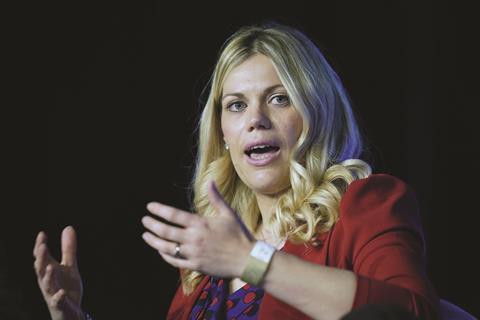
You taught science in a secondary school, then had a spell as an entrepreneur. What led you into politics?
When my youngest was getting ready to start school, I was a parish councillor. When I got the opportunity to stand in local elections, I felt that was the right thing to do, even though I’d not been a member of a party before. Then I went along to a Conservative Party Conference in October 2018. It’s a bit like New Wine, but with more wine! I met some brilliant people who encouraged me to stand for election and, three weeks later, I was a parliamentary candidate.
Looking back, you can say it’s an interesting journey, but at the time it’s only about taking the next step and trying to discern what God’s saying. Then you look back and think: Oh, there was meaning in that journey.
Being honest about your faith is actually popular. People might disagree, but they respect your honesty
Have you always had a faith? Or was there a moment when you found God?
I was brought up in a Christian family, so I always had an intellectual faith, in that I didn’t doubt the truth of it. At university, I didn’t question the basics of faith, but I certainly questioned: Why does this have to be everything? Why can’t you just believe these things and live like anybody else? Over two or three years, I started to understand that if this was true, then it had to be everything.
Having children was really good for me because it teaches you to let go of some things. You lose autonomy over your life when you have small children; you’re at their beck and call. Coming into politics has been really helpful in letting go of other things, because you have to stop caring what people think about you; you have to take a lot of risks.
Our culture tells us that freedom means doing whatever you want, whenever you want. But the Christian understanding of freedom is having control over your own desires, ambitions, needs and thoughts so that you are free to do what is necessary and right, not just what you feel like at the time. That’s the freedom that a slow but long faith journey brings you.
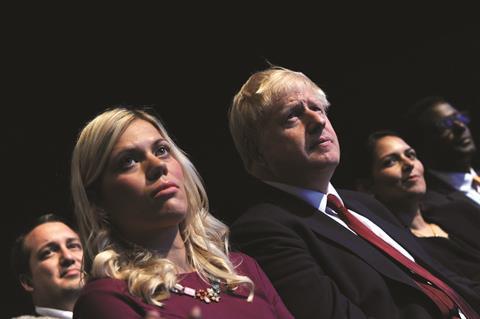
Tim Farron MP said it “felt impossible” to hold faithfully to the Bible’s teaching while also leading a political party. Is it impossible for an evangelical to progress in politics?
Probably in the Lib Dems, to be fair, [laughs] not to be too partisan!
No, I don’t think so. Look at Kate Forbes [Member of the Scottish Parliament and previously a candidate for leadership of the Scottish National Party]. She was grilled. She gave honest answers. She didn’t try to hide her beliefs. She was absolutely torn apart in the media. And yet, in one of the most progressive left-wing parties in this country, she got 48 per cent of the vote, which tells you two things. First, being honest about your faith is actually popular. People might vehemently disagree [with you] but they will respect your honesty. They want people who don’t try to be what they’re not.
It also shows that while our media might be obsessed with people who have a faith and whether that means there’s a nefarious influence going on, most people are not that bothered. They look at a politician and think: “Have you got good ideas? Are you telling the truth? Do you really mean what you say?” I bet a lot of the 48 per cent of the SNP were not bothered about which church Kate Forbes went to, they just thought she was competent, intelligent and would make a good leader.
There might be some prejudice, but I don’t think there’s a barrier to being honest about your faith. Actually, most of the barrier is internal; Christians get very worried about how our views will be perceived and what people will think about us. That is a question of: Do we have the courage?
Do you consider yourself a feminist?
I believe that women and men are equal, but I believe we’re very different. When [only] one sex wins, both sexes lose. And we’ve had so much conflict and antagonism between the sexes in the last 50 years.
There has definitely been progress: many more opportunities for women and acceptance of women in leadership; those are good things. But fundamentally, men and women are not only biologically different, we’re psychologically different. That is beyond scientific doubt. The way men and women parent is different. What a mother gives a child is very different – but equal to – what a father gives a child. I don’t know if that makes me a feminist or not.
How do you balance the demands of work, family and church?
It is really tough. I was so fortunate that when my kids were small, I was able to work part-time and, for a couple of years, not at all. I feel very privileged to [have been] able to do that. Motherhood gets such a bad name in our culture. It is hard, but it is the most fulfilling thing you will ever do. That is something that our culture doesn’t tell the story of, and it puts people off, sadly.
My husband is amazing, my parents were amazing. You know, we try and make use of all the favours we can find! The kids are older now and more independent, but it is still pretty frantic.
Where have you seen God really move in your life?
When you talk to a lot of people in politics, it’s a horrible journey of ten or 15 years of delivering leaflets, knocking on doors in the rain, applying for seats and not being accepted, standing in elections and losing.
I’m so grateful that once I felt like this was what God was calling me to, it took very little time. I can’t claim any credit for becoming a candidate; I was just in the right place at the right time. But I’m very grateful for that.
To hear the full interview listen to Premier Christian Radio at 8pm on Saturday 10 February, or download The Profile podcast at premier.plus/theprofile













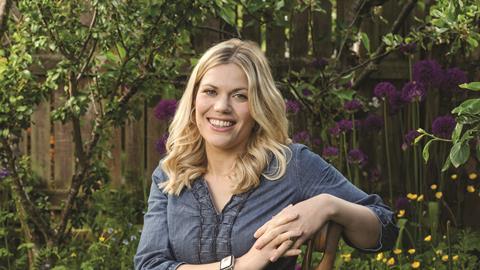

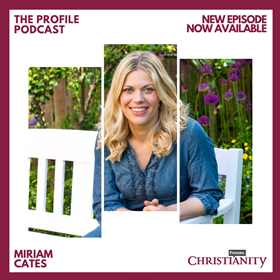


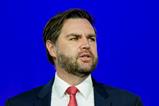





















No comments yet